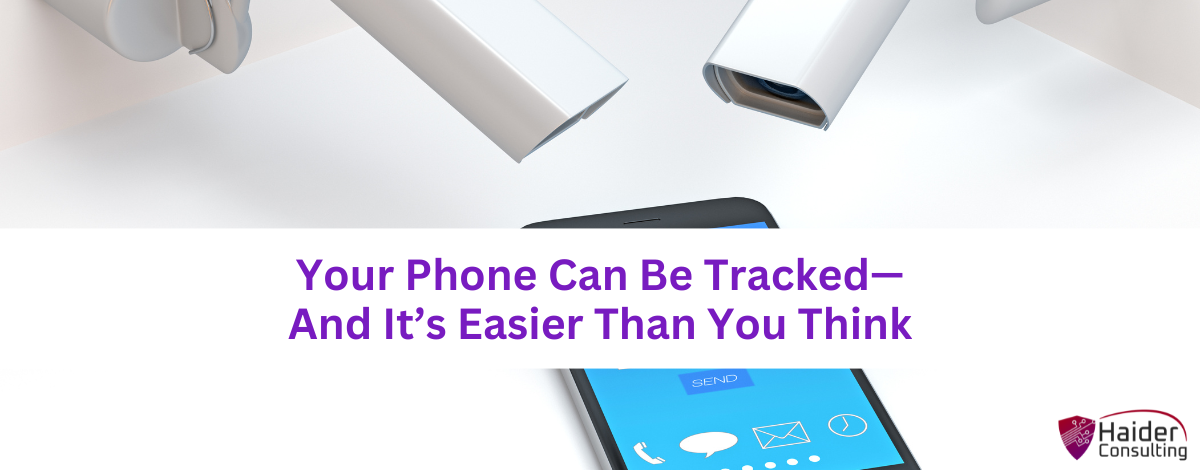These days, our phones are more than just gadgets—they’re extensions of our lives and businesses. We use them to store passwords, communicate with clients, access banking apps, and even run entire operations on the go. But here’s the uncomfortable truth: tracking someone’s phone is surprisingly easy, and it’s happening more often than most people realize.
And it’s not just cybercriminals you need to worry about. A jealous partner, a disgruntled employee, or even a competitor could potentially spy on your phone activity. For business owners, that means more than a privacy risk. It could expose your clients, your employees, and your bottom line.
How Phone Tracking Works
There are a number of ways your phone can be monitored, and the methods don’t require advanced hacking skills:
- Spyware Apps: These apps can be secretly installed to track calls, texts, and app activity. Some even have the power to switch on your microphone or camera without you realizing it.
- Phishing Links: A single click on a bad link in an email or text message can download tracking software to your device without your knowledge.
- Location Sharing: Many apps request access to your location. If you don’t carefully manage permissions—or if you forget about old logins—your location could be quietly shared in the background.
- Stalkerware: This is spyware specifically designed to remain hidden. It often disguises itself as harmless apps or tools so you don’t think twice about keeping it installed.
What makes this worse is how easy these tools are to get. Many are sold legally online under the label of “monitoring software.”
Why This Matters for Business Owners
For the average person, a hacked phone is a nightmare. But for business owners, it can be devastating. Think about what’s stored on your device:
- Confidential client emails and documents
- Banking and payment information
- Employee and payroll records
- Saved logins to critical business systems
If someone gains access to your phone, it’s like handing them the keys to your entire business. The problem is, most people don’t even realize they’re being tracked until the damage is already done.
Consider this: the average data breach costs small businesses around $120,000 (Verizon Data Breach Investigations Report). A cybercriminal doesn’t have to breach your office network or trick your staff—if they can get into your phone, they may already have everything they need.
Warning Signs That Your Phone Might Be Tracked
Spyware is built to be invisible, but there are still clues that something isn’t right. Pay attention if you notice:
- Battery draining much faster than normal
- Unexplained spikes in data usage
- Your phone feels hot even when idle
- Strange apps or icons you don’t remember installing
- Background noise or clicks during phone calls
- Frequent crashing or freezing
One of these issues alone may just be a glitch. But when several show up together, it’s worth looking deeper.
How to Protect Yourself from Phone Tracking
If you suspect that someone is tracking your phone—or you simply want to lower your risk—take these steps:
- Run a Security Scan
Install and run a trusted mobile security app. These tools can detect and remove spyware, and some even provide ongoing protection. Just be cautious, as there are many fake apps out there, too! - Check App Permissions
Go through your apps and review their permissions. Many apps don’t actually need access to your microphone, camera, or location. Turn off what’s unnecessary. - Update Your Phone Regularly
Software updates often patch vulnerabilities that hackers rely on. Make sure your phone is always running the latest version. - Perform a Factory Reset if Needed
If spyware is confirmed and can’t be removed, a factory reset wipes the device clean. Just be sure to back up important files first—and immediately update your passwords afterward. - Use Strong Security Controls
Turn on biometric logins like fingerprint or Face ID. Enable multi-factor authentication for all business apps and accounts. This way, even if someone gets your password, they can’t log in without the second layer of security.
Don’t Leave Your Phone—or Your Business—Exposed
As a business owner, your phone isn’t just a personal device. It’s your mobile command center, customer file cabinet, and sometimes even your bank vault. If it’s compromised, your business could suffer financially and lose the trust of your clients.
Cybercriminals look for the easiest entry point—and often, that’s the phone in your pocket.
That’s why securing your devices is no longer optional. It’s a must.
If you’re serious about protecting your data, your team, and your clients, start with a FREE Discovery Call. We’ll can help identify hidden vulnerabilities in your systems and devices, and give you clear recommendations to strengthen your defenses.
Book My 17-Minute Call





